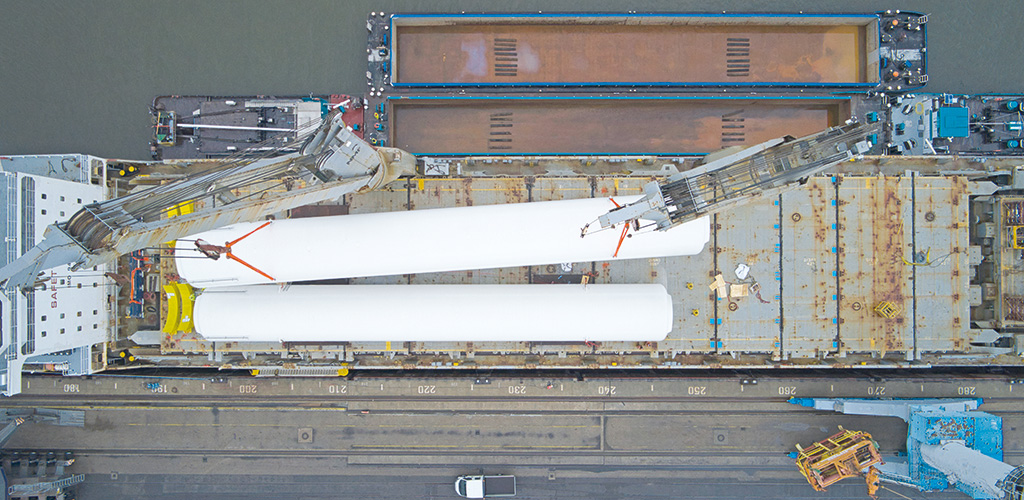Water Restrictions Prompt Project Switch

By Malcolm Ramsay
 As the energy transition accelerates, liquefied natural gas, or LNG, has emerged as a winner, with demand for the fuel growing rapidly in recent years. Meeting this demand has required major new infrastructure, from sprawling liquefication plants to giant storage facilities. Project logistics specialist deugro recently assisted in a major breakbulk move to support this industry when it delivered four outsized LNG tanks from the Czech Republic to the Caribbean.
As the energy transition accelerates, liquefied natural gas, or LNG, has emerged as a winner, with demand for the fuel growing rapidly in recent years. Meeting this demand has required major new infrastructure, from sprawling liquefication plants to giant storage facilities. Project logistics specialist deugro recently assisted in a major breakbulk move to support this industry when it delivered four outsized LNG tanks from the Czech Republic to the Caribbean.
The complex project involved maneuvering tanks that measured almost 50 meters in length and weighed more than 200 tonnes each. Jens Klie, vice president at deugro USA, told Breakbulk that constant coordination with the client throughout all stages of the project was vital for success, noting that “partnering up, communicating closely with our client, dteq and all subcontractors” led to successful execution of the project and that the group’s “longstanding experience of almost 100 years” proved invaluable in meeting many of the unique challenges posed by this move.
Meticulous Preparation
The first challenge in this project was delivering the cargo from the land-locked Czech Republic to a suitable port for transfer to ocean vessel. The client required delivery from the manufacturer’s yard in Decin, near the border of the Czech Republic and Germany, but this was around 500 kilometers from the coast and road transport was deemed too expensive. To complicate matters, each individual tank weighed 225.4 tonnes and measured 48.93 meters in length, 5.8 meters in width, and 6 meters in height.
Prior to commencing any loading, deugro conducted in-depth pre-planning to identify risk factors that might affect transit times, loading or cargo securing operations. Through this process, the team identified a route from the manufacturer’s facility by road to the nearby Port of Rozbelesy and from there by barge to the Port of Hamburg, where it would be transferred to ocean vessel.
“As per the client’s requirements, detailed method statements had to be prepared for all transportation aspects, such as for the road transportation from the production facility to the Port of Rozbelesy, Decin, Czech Republic, including all of the barge loading and cargo securing operations. dteq was chosen because of its economic offer and its long track record in such projects and operations,” Klie said.
Having chosen a route, deugro next selected local logistics expert Universal Transport to transport the LNG storage tanks from the factory to the Port of Rozbelesy. Petr Nálevka, project manager at Universal Transport, oversaw this stage, delivering the tanks on the three-kilometer journey from the manufacturer’s premises through Decin’s city center.
Two 2x4-axle prime movers and a specialist 22-axle Goldhofer hydraulic platform trailer configuration, separated in two 11-axle units, each equipped with a turntable, were chosen for this move, with each tank transported at walking speed, at a maximum of 5 kilometers per hour.
Despite the relatively short length of this leg, it still required extensive pre-planning because roads had to be completely closed off by traffic police, street lamps and road furniture had to be dismantled, and overhead wires adjusted to accommodate the size of the loaded trailer convoy.
“The biggest challenge to prepare and execute was the transport across Decin’s narrow streets,” Nálevka told Breakbulk. “The excellent cooperation with deugro enabled us to perform this defiant project [and it was] a smooth success.”
Headquartered in Paderborn in western Germany, Universal Transport is a solutions supplier for heavy load logistics worldwide. Employing more than 700 employees across Europe the firm has a strong presence in the Czech Republic.
Flexible Response
With the transport originally planned to take place in December 2020, the first issue encountered by the team was that the water level of the Elbe River was too low for barge transport, with only 90 centimeters instead of the required 1.90 meters.
“A quick contingency solution had to be developed to transport the LNG tanks from the manufacturer’s premises so that the movement would not interrupt the ongoing production processes at the Decin fabrication plant,” Klie explained.
As a result, deugro arranged for three of the LNG storage tanks to be self-loaded with modular hydraulic trailers from the external storage area of the factory, where they were safely positioned on elephant legs during the manufacturing process. This solution was in line with the alternative schedule that deugro developed in close cooperation with all parties involved and thanks to the resourcefulness of the team, the cargo was stored securely until the water levels recovered.
With approval in place to proceed, barge loading operations began directly onto four barges, one for each tank, with Universal Transport and deugro overseeing transfer to the waiting barges using a Liebherr LTM 1500-8.1 and a Liebherr LR 1750 crane.
Founded in 1924 in Frankfurt am Main, Germany, deugro provides specialist freight forwarding and project logistics with a focus on turnkey industrial projects. After almost 100 years, the firm remains family-owned and has grown to a network of more than 70 company-owned offices in over 40 countries. The group provides ocean and inland waterway freight services, road and rail transportation as well as air freight.
With the cargo secured in place, the four river barges were linked together and then pushed by a tugboat in twos, ready for their voyage to the Port of Hamburg. This journey of over 536 kilometers, took eight days in total and the four tanks arrived in Hamburg safely and on time.
Seamless Transfer
Upon arrival in Hamburg, the cargo was then ready for direct transshipment to a multipurpose heavy-lift vessel, a complex move given the size of each tank. This stage of the project was overseen by dteq Transport Engineering Solutions, a subsidiary of the deugro group with specialist experience in marine engineering.
“Operation-specific toolbox talks with all parties involved is mandatory, in order to clearly define the different steps of the operation, the responsibilities and the line of communication to reduce the potential risks for such operations to a minimum,” Felix Kok, regional head of transport engineering EMEA, dteq Transport Engineering Solutions, explained.
Headquartered in Bremen in the north of Germany, dteq Transport Engineering Solutions was founded in 2016 by Thomas C. Press, the owner and CEO of the deugro group and remains part of the family company.
Alongside marine engineering solutions, dteq also provides port captain, surveying and supervision services, and project consulting services.
As per the contractual agreement, a U.S.-flagged vessel had to be selected and used for the ocean voyage.
Therefore, deugro chose Ocean Giant from the carrier U.S. Ocean – a heavy-lift, box-hold multipurpose ‘tweendecker vessel with two 400-tonne cranes with a combined lifting capacity of 800 metric tons, ideally suited for the loading and unloading operations.
“To ensure the safety of all parties involved and trouble-free operations, especially in times of Covid-19, deugro prepared comprehensive risk assessments and work instructions. These were monitored and communicated daily with all parties involved. Furthermore, meetings and toolbox talks were held with all persons involved before all critical operations to minimize risks,” Klie said, with the ocean carrier and the port captain closely involved in preparing lifting, rigging and stowage plans.
The complex loading process was also highly dependent on weather conditions and Klie noted that “if the weather worsened, the lifting operation would have been stopped.” To ensure that all partners were in agreement on the operational limits for this move, the teams set maximum environmental conditions of 20 knots wind speed (approx. 10 m/s), 0.5 meter significant wave height, 0.0 meters swell height, and one knot (approx. 0.5 m/s) current speed.
“The challenging part was the direct transshipment from the barge onto the vessel, as handling cargo from a floating object onto a floating object is always a critical operation. Strong weather conditions like wind as well as the current of the river, which usually keeps any floating object in slight motion, can result in swinging cargo when initially lifted,” Eva Klepping, transport engineer, dteq Transport Engineering Solutions, explained.
Time is Right
With the right weather conditions in place, the four tanks were then loaded in tandem lift using the vessel’s on-board cranes. Two of the LNG tanks were loaded under deck and the other two were positioned on the weather deck.
“After two days of loading, the cargo securing was safely and successfully completed, and the vessel was ready to set sail for the 17-day ocean voyage to its destination in the Caribbean Sea,” a spokesperson for the Port of Hamburg said.
Upon arrival in the Caribbean, the Ocean Giant successfully docked, ready to transfer its cargo for onward transport by road. Method statements had already been prepared by carrier U.S. Ocean for discharge operations from the ocean vessel to the barge at the port of destination, and these were complete without issue.
“All four tanks were discharged directly onto barge by the vessel’s own two 400-tonne combinable cranes,” Klie said.
From there, the components were delivered to their final destination where they will play a vital part in infrastructure to support the development of the LNG industry. Long underdeveloped, the Caribbean has seen surging investor interest in recent years due to its proximity to regional LNG suppliers and the U.S. Gulf Coast and the tanks will now help accelerate the uptake of low carbon fuels in the global energy transition.
Based in the UK, Malcolm Ramsay has a background in business analysis and technology writing, with an emphasis on transportation and ports.
Credit: deugro
